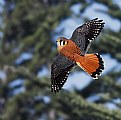
Chris Lauritzen
(K=14949) - Comment Date 1/27/2003
|
Grady,
The WOCA has actually been around for a while now. The latest issue of Shutterbug has a review of it.
|
|
|
|

Robert Fox
(K=208) - Comment Date 4/13/2003
|
Grady,
While the Holgas are nice, they are almost too nice. Get a Diana or Diana clone (there are at least 20 variations) that have two rough exposure settings (about 1/100th and bulb), three rough aperture settings, and a plastic lens and body. Since I got a clone a few months ago (a "Windsor") I'm in love with it. These cameras allow you to focus completely on comppsition and creativity above everything else. I shoot medium format exclusively, and these plastic cameras are making me a better photographer without a doubt.
|
|

|
|

Petros Stamatakos
(K=12101) - Comment Date 4/22/2003
|
Robert - Don't take this the wrong way, but how exactly is a plastic camera making you a better photographer? You have absolutely no artistic control over your images.
Are you suggesting that the "vignation" and "softness", which a TOY camera produces, can add favourably to an image? Perhaps they do... I could be wrong.
I will agree with you that a toy camera such as the "Holga" can produce some "interesting" results, but can a toy camera make you a better photographer? You seem to think so... I just disagree :-)
|
|
|
|

Robert Fox
(K=208) - Comment Date 4/24/2003
|
Peter,
The answer is easy. Toy cameras can force you to be a better photographer because the "technique" is essentially reduced to point and shooting. No technical adjustments to really do. Most photographers spend much more time devoted to hardware than they do to developing a creative vision.
If you can make interesting photos with a toy camera of any kind, you will probably take more interesting pictures using a quality camera and lens. Pinhole artists are another example of creativity over hardware.
|
|
|
|

David Goldfarb
(K=7611) - Comment Date 4/25/2003
|
Pinholes and Holgas are still hardware and, to be fair, are fetishized as much as the latest digiwhatzits and aspheric-L zooms.
That said, as someone who likes to shoot large format, which is often a slow and methodical activity, going out with a 35mm camera, high speed film, and a pinhole lens cap can inject some spontaneity back into my work. I learn something by accommodating my own procedures to the chance elements associated with pinhole photography, toy cameras and such. I don't worry about "optimizing" everything in the technical sense, because that is not an issue, and generally in art, that is not the issue.
Technique is a distraction until it becomes so ingrained that you don't have to think about it anymore. The same might be said of music. Pinholes and toy cameras (and point-and-shoots, for that matter) offer a way to set aside the technical issues and to concentrate on the important things, and maybe that redirection of attention will carry over to your other equipment.
|
|
|
|

Shannon Richardson
(K=1004) - Comment Date 5/4/2003
|
"Don't take this the wrong way, but how exactly is a plastic camera making you a better photographer? You have absolutely no artistic control over your images." Actually you have more. You pay more attention to what you are shooting. You are in the moment. A zen kinda thing. Using a holga makes you a better photographer because it forces you to understand lighting and how to use it with the limited controls the camera has. It makes you think on your feet and go with the flow of whats at hand.
|
|
|
|

Conrad Grams
(K=273) - Comment Date 5/8/2003
|
I f you give an excellent fine artist a plastic camera they will more often than not outperform most people with the latest and the greatest equipment. In other words composition and use of color with the subject not being ignored is more importaint than equipment if your aim is to create art. Does that answer the question of how a toy can make you a better photographer?
|
|
|
|
















